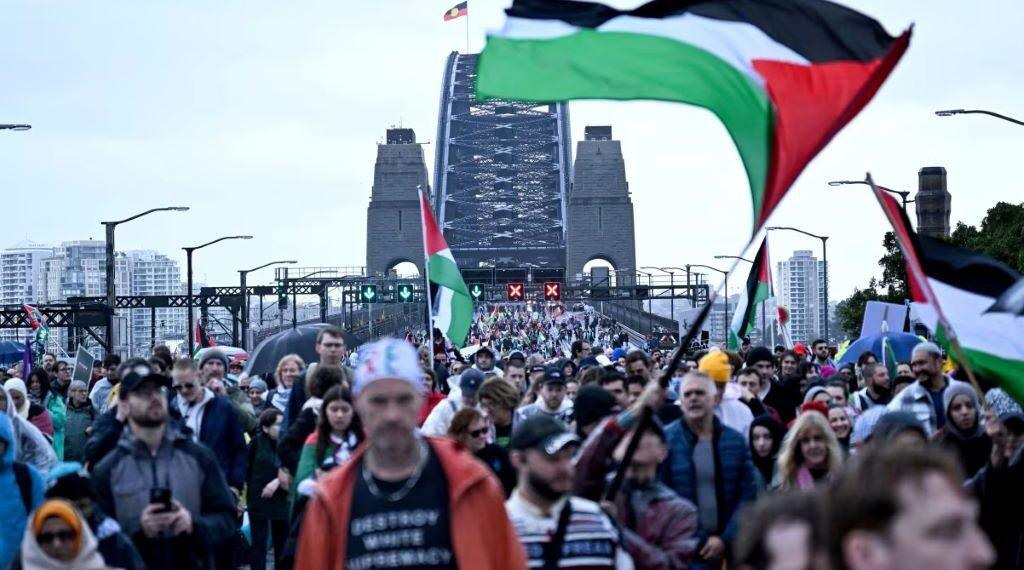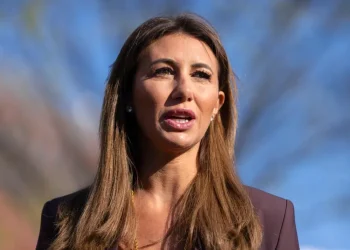Massive Sydney Harbour Protest Signals Rising Global Alarm Over Gaza Crisis
Published: August 9, 2025 – 14:00 (U.S. Eastern Time)
Tens of thousands march in Australia, reflecting growing international calls for peace and humanitarian action
Sydney, Australia – A landmark protest on the Sydney Harbour Bridge has drawn unprecedented numbers in support of Gaza, underscoring the growing global outcry over the humanitarian crisis in the region. The mass demonstration, held in heavy rain and strong winds, is being viewed by many as a pivotal moment in Australia’s political and social response to the conflict.
According to police estimates, at least 90,000 people participated, though organizers claimed the figure could be closer to 300,000. The event, planned in just one week, is part of a broader surge in international solidarity and calls for urgent action.
Growing Public Support for Gaza
Organized by the Palestinian Action Group, the Sydney march was the latest in a series of demonstrations that have taken place fortnightly since Israel’s 2023 invasion of Gaza. The group said the decision to stage the protest on the Harbour Bridge was intended to send a clear, highly visible message both to Australia and the world.
“We wanted something bold and symbolic,” said organizer Josh Lees. “Marching over Sydney Harbour Bridge captured the imagination of people horrified by what’s happening in Gaza.”
Recent events abroad have inspired Australian activists, including prominent pro-Palestinian statements at the Glastonbury Festival in the UK and the electoral victory of U.S. politician Zohran Mamdani, who received Jewish community backing despite his criticism of Israel. In Australia, support for Gaza has expanded beyond activist circles, drawing endorsements from church groups, trade unions, and members of parliament.
Government Response to the Crisis
Australian Foreign Minister Penny Wong acknowledged the scale of the demonstration, saying it reflected widespread public distress.
“I anticipated marches of this scale,” Wong told ABC Radio National. “Australians are horrified by the catastrophic humanitarian situation in Gaza, the deaths of civilians, and the withholding of aid. They want peace and a ceasefire – and that’s what the government is seeking.”
Prime Minister Anthony Albanese’s government faces mounting pressure to join other U.S. allies – including the United Kingdom, France, and Canada – in formally recognizing a Palestinian state. Discussions are ongoing ahead of the United Nations General Assembly (UNGA) in September, with Wong warning that “there is a risk there will be no Palestine left to recognize” without urgent action.
Calls for Stronger Measures
While recognition of Palestinian statehood was not a core demand of Sunday’s protest, activists are calling for stronger measures, including sanctions against Israel, an end to arms trade links, and the immediate delivery of humanitarian aid.
The Australian government maintains it has not supplied weapons or ammunition to Israel for at least five years. However, Australian companies produce components for F-35 fighter jets used by Israel, as part of a U.S.-coordinated supply chain.
Middle East expert Ian Parmeter from the Australian National University said Canberra could block the export of these components, but such action might have limited impact given global production capacity.
To date, Australia has sanctioned two far-right Israeli ministers over their role in inciting violence in the West Bank, in coordination with countries such as Canada, New Zealand, Norway, and the UK.
International Political Context
Former Human Rights Watch executive director Kenneth Roth said only U.S. political pressure could significantly influence Israeli policy. “The one person who has leverage over Netanyahu is U.S. President Donald Trump,” Roth told ABC, suggesting that conditioning arms sales could force an end to mass atrocities.
However, experts remain uncertain about whether Washington is willing to exert such influence.
Social Tensions in Australia
The Gaza conflict has had ripple effects within Australia’s multicultural communities. Reports of antisemitism and Islamophobia have surged since October 2023, prompting the government to appoint dedicated envoys to address hate incidents.
A recent proposal by antisemitism envoy Jillian Segal included education campaigns, law enforcement reforms, and penalties for institutions failing to act on reported hate speech. Critics, however, warn such measures could undermine free expression.
The scale of Sunday’s protest was seen by supporters as a victory for free speech. New South Wales Police unsuccessfully sought a court order to block the march, citing safety concerns. A judge ruled that prohibiting the demonstration would not make it safer, as large crowds were expected regardless.
Mixed Reactions and Media Coverage
The protest generated starkly different portrayals in the Australian media. The West Australian newspaper focused on isolated incidents such as burning flags and theatrical displays, while the Sydney Morning Herald highlighted the peaceful mass turnout with the headline, “Sydney says ‘enough’.”
Israeli officials criticized the march, with Foreign Minister Gideon Sa’ar warning of what he described as dangerous alliances between radical political factions and extremist groups.
The Australian Iranian Community Alliance also questioned whether all participants were committed to peace, citing controversial imagery displayed at the event.
Humanitarian Aid and Next Steps
Following the march, the Australian government pledged an additional 20 million Australian dollars (USD $13 million) in humanitarian aid to Gaza, bringing its total commitment since October 2023 to 130 million Australian dollars (USD $84 million). However, it stopped short of meeting other protester demands.
Activists are now planning a nationwide day of action on August 24, aiming to sustain momentum and push for stronger policy changes.
“I think Sunday’s demonstration shows the tide is shifting,” said Lees. “People are seeing through the propaganda and standing up in unprecedented numbers to stop what they believe is a genocide.”
This article was rewritten by JournosNews.com based on verified reporting from trusted sources. The content has been independently reviewed, fact-checked, and edited for accuracy, neutrality, tone, and global readability in accordance with Google News and AdSense standards.
All opinions, quotes, or statements from contributors, experts, or sourced organizations do not necessarily reflect the views of JournosNews.com. JournosNews.com maintains full editorial independence from any external funders, sponsors, or organizations.
Stay informed with JournosNews.com — your trusted source for verified global reporting and in-depth analysis. Follow us on Google News, BlueSky, and X for real-time updates.














